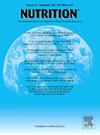Disproportionate burden of poor diet quality among individuals diagnosed with oropharyngeal cancer during critical periods of cancer care: The U-DINE study
IF 3.2
3区 医学
Q2 NUTRITION & DIETETICS
引用次数: 0
Abstract
Background
Poor diet quality is a key modifiable determinant of health at all stages of life, with significant implications for individuals diagnosed with oropharyngeal cancer (OPC), in whom swallowing difficulties and treatment side effects often restrict diet. Understanding diet quality and specific dietary inadequacies faced by this population during critical periods of cancer care is crucial to identifying interventions to improve cancer outcomes in a rapidly growing population of cancer survivors.
Methods
Between February 2022 and April 2024, diet was assessed using two non-consecutive 24-hour recalls by a trained registered dietitian among 68 individuals at diagnosis and 113 long-term survivors (≥18 months after treatment) treated at MD Anderson Cancer Center or Michael E. DeBakey Veterans Affairs Medical Center. Diet quality scores were calculated based on the Healthy Eating Index (HEI-2020), reflecting adherence to the 2015 to 2020 Dietary Guidelines for Americans, and the World Cancer Research Fund/American Institute for Cancer Research (WCRF/AICR) recommendations. Daily intakes of 21 food components of dietary guidelines were calculated using averages from two dietary interviews.
Results
Among individuals at the time of OPC diagnosis (mean age, 60 years), the mean HEI-2020 was 49.3 out of 100, which is nearly 50% below the optimal score and 19% lower than the mean score of 61 for generally healthy U.S. adults of similar age. Among long-term survivors (65 ± 8 years old), mean scores were similarly low at 48.3. Mean WCRF/AICR adherence scores were 2.2 out of 5 for individuals at diagnosis, and 2.8 for long-term survivors, 44% to 56% below the WCRF/AICR optimal score. Major dietary insufficiencies included suboptimal intake of fruits, vegetables, whole grains, greens and beans, dairy, healthy fats, and excessive consumption of sodium, saturated fats, and ultra-processed foods.
Conclusions
Our findings highlight poor diet quality among individuals with OPC both at diagnosis and during long-term survivorship, underscoring the need for targeted dietary interventions during critical periods of cancer care.
在癌症治疗的关键时期,诊断为口咽癌的个体中不良饮食质量的不成比例负担:U-DINE研究
背景:不良的饮食质量是生命各个阶段健康的关键可改变决定因素,对诊断为口咽癌(OPC)的个体具有重要意义,其中吞咽困难和治疗副作用通常限制饮食。了解这一人群在癌症治疗的关键时期所面临的饮食质量和特定的饮食不足,对于确定干预措施以改善快速增长的癌症幸存者群体的癌症结局至关重要。方法:在2022年2月至2024年4月期间,在MD安德森癌症中心或Michael E. DeBakey退伍军人事务医疗中心接受治疗的68名确诊患者和113名长期幸存者(治疗后≥18个月)中,由训练有素的注册营养师通过两次非连续24小时召回来评估饮食。饮食质量评分是根据健康饮食指数(HEI-2020)计算的,反映了对2015年至2020年美国人饮食指南的遵守情况,以及世界癌症研究基金会/美国癌症研究所(WCRF/AICR)的建议。使用两次膳食访谈的平均值计算膳食指南中21种食物成分的每日摄入量。结果在诊断为OPC时(平均年龄60岁)的个体中,平均HEI-2020为49.3分(满分100分),比最优评分低近50%,比一般健康的同龄美国成年人的平均得分61分低19%。在长期幸存者(65±8岁)中,平均得分同样低,为48.3分。诊断时WCRF/AICR的平均依从性评分为2.2分(满分5分),长期幸存者为2.8分,比WCRF/AICR最佳评分低44%至56%。主要的饮食不足包括水果、蔬菜、全谷物、绿色蔬菜和豆类、乳制品、健康脂肪的摄入量低于理想水平,以及钠、饱和脂肪和超加工食品的过量摄入。结论:我们的研究结果强调了OPC患者在诊断和长期生存期间的饮食质量差,强调了在癌症治疗的关键时期进行有针对性的饮食干预的必要性。
本文章由计算机程序翻译,如有差异,请以英文原文为准。
求助全文
约1分钟内获得全文
求助全文
来源期刊

Nutrition
医学-营养学
CiteScore
7.80
自引率
2.30%
发文量
300
审稿时长
60 days
期刊介绍:
Nutrition has an open access mirror journal Nutrition: X, sharing the same aims and scope, editorial team, submission system and rigorous peer review.
Founded by Michael M. Meguid in the early 1980''s, Nutrition presents advances in nutrition research and science, informs its readers on new and advancing technologies and data in clinical nutrition practice, encourages the application of outcomes research and meta-analyses to problems in patient-related nutrition; and seeks to help clarify and set the research, policy and practice agenda for nutrition science to enhance human well-being in the years ahead.
 求助内容:
求助内容: 应助结果提醒方式:
应助结果提醒方式:


